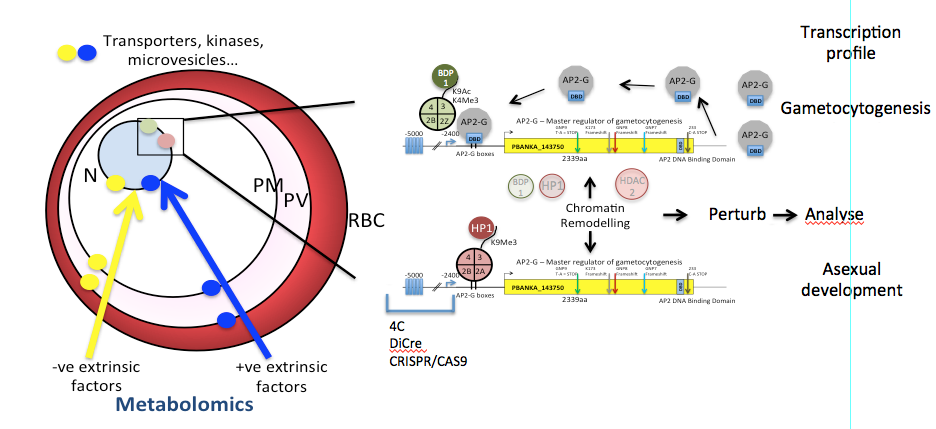The Waters Group
Current Research
The major objective of the Glasgow laboratory is to understand the molecular developmental biology that is associated with sexual development.
There are three main themes to the research:
1. Triggers for gametocytogenesis. A transcription factor underpinning commitment to this critical event has been recently identified in the laboratory (Sinha et al (2014) Nature). Its mode of action and control of its expression are currently under study.
2. Influence of host environment on parasite development. This is an interest largely driven by metabolomics and seeks to understand the resources available to the intracellular parasite and the consequences of those resources for drug development and parasite maturation.
3. Development of tools for the more sophisticated genetic engineering of malaria parasites
The laboratory analyses these issues using a polyomics approach which is institutionalised in Glasgow and includes: metabolomics, NGS, proteomics, parasite genetic manipulation and complemented by a fully functioning insectary. Technology development is also a key part of our activities where we have recently developed three new approaches to inducible regulation of gene/protein expression with a view to assigning function to genes/proteins

Our laboratory currently has four post-doctoral researchers with a great range of molecular biological expertise, four technical support staff and four PhD students. Our activities are complemented by three other research groups working on malaria or Toxoplasma and through our participation in the WTCMP of which Prof Waters is Director. Together with the many other parasitological groups at Glasgow there is the greatest concentration and breadth of molecular parasitology expertise in the UK. Prof. Waters was also Scientific Director of Evimalar, a European Commission-funded Network of Excellence that improved European and global collaboration in the basic research of malaria parasite biology and their interactions with their hosts and vectors. Evimalar has now devolved to form Evimalar EEIG (European Economic Interest Group) which contains 13 founder members and can partner traditional institutions in bids for international funding.
Research Group Staff
Research Group Staff
Angela McIlhoney, Technician
Farzana Khaliq, Technician
Julie Martin, Laboratory Manager


